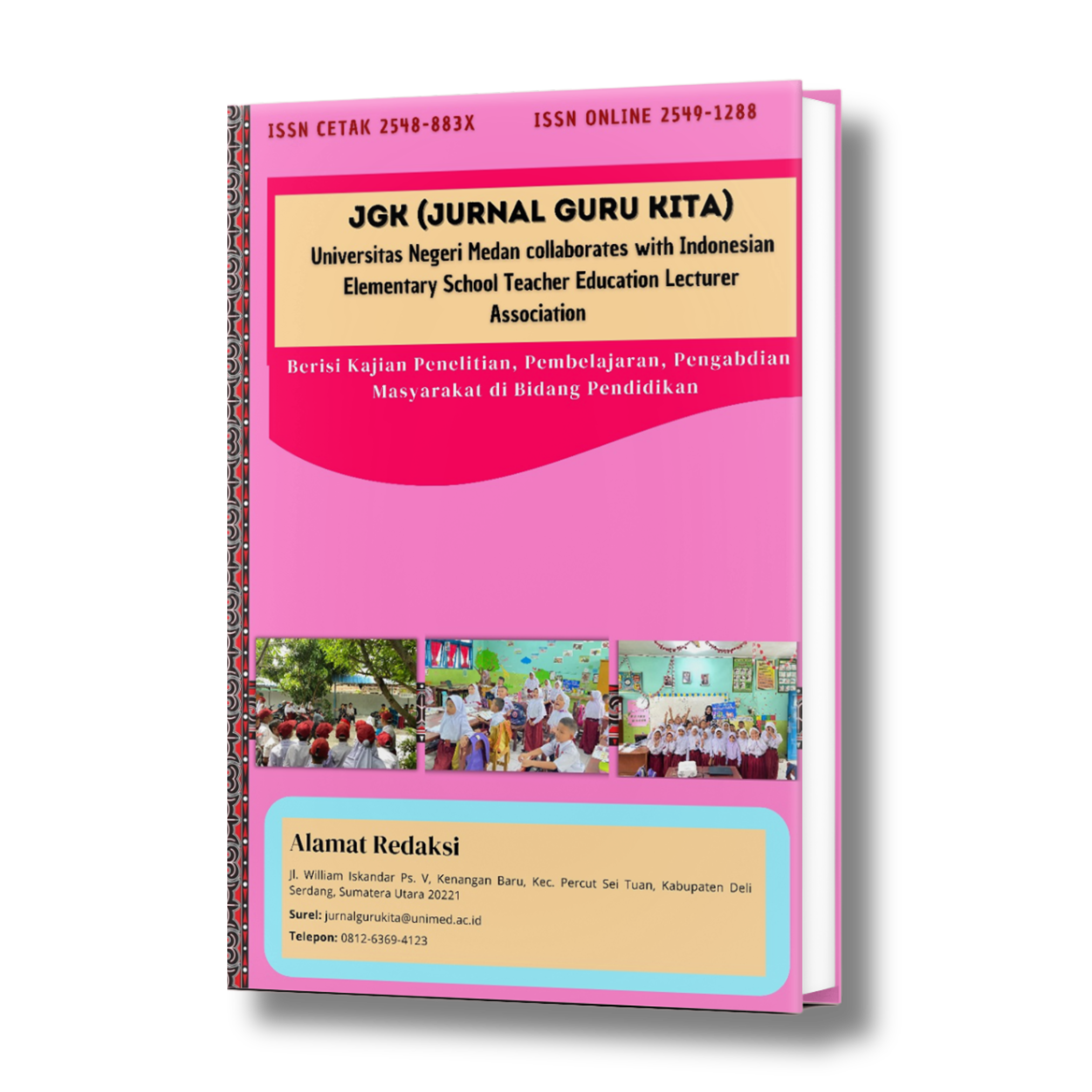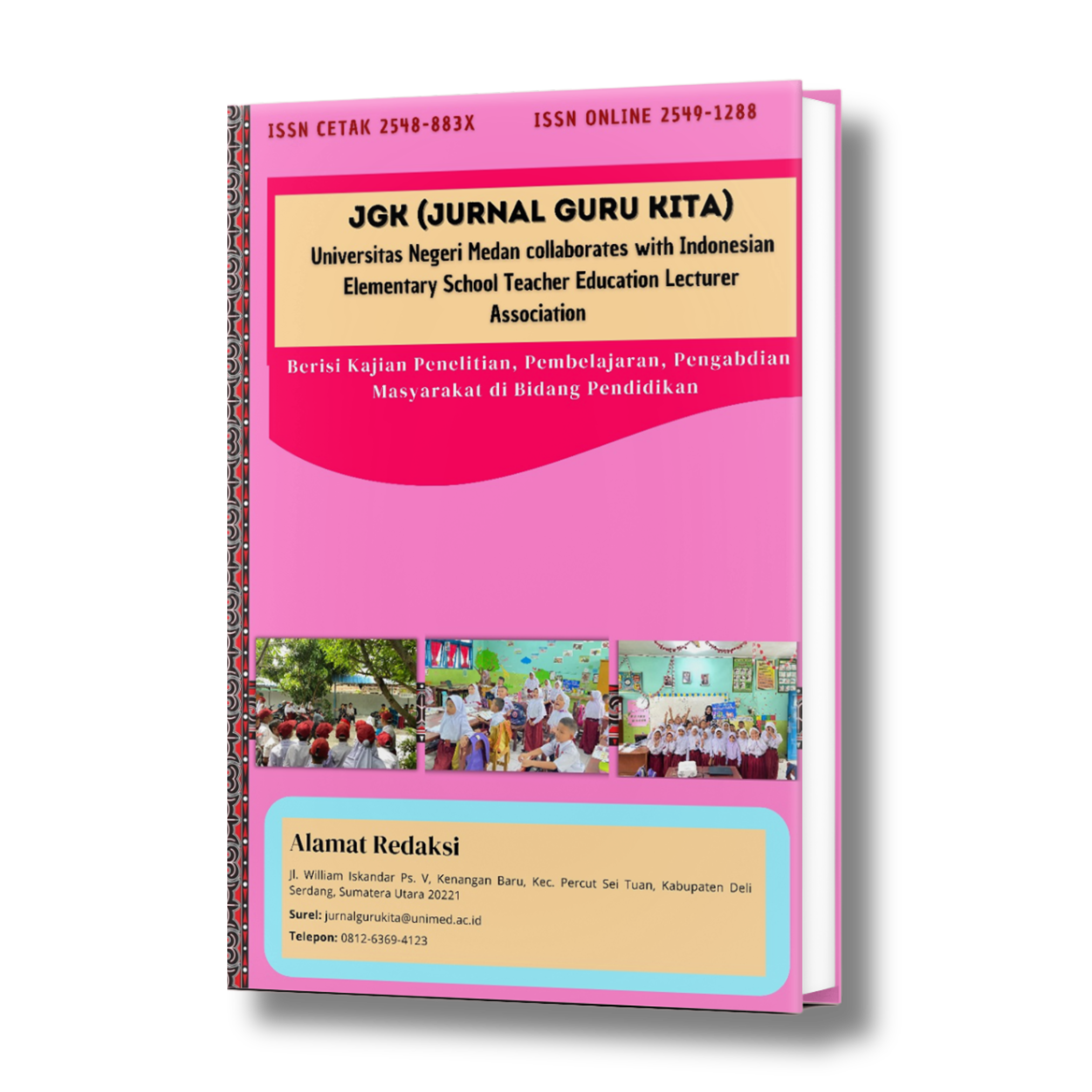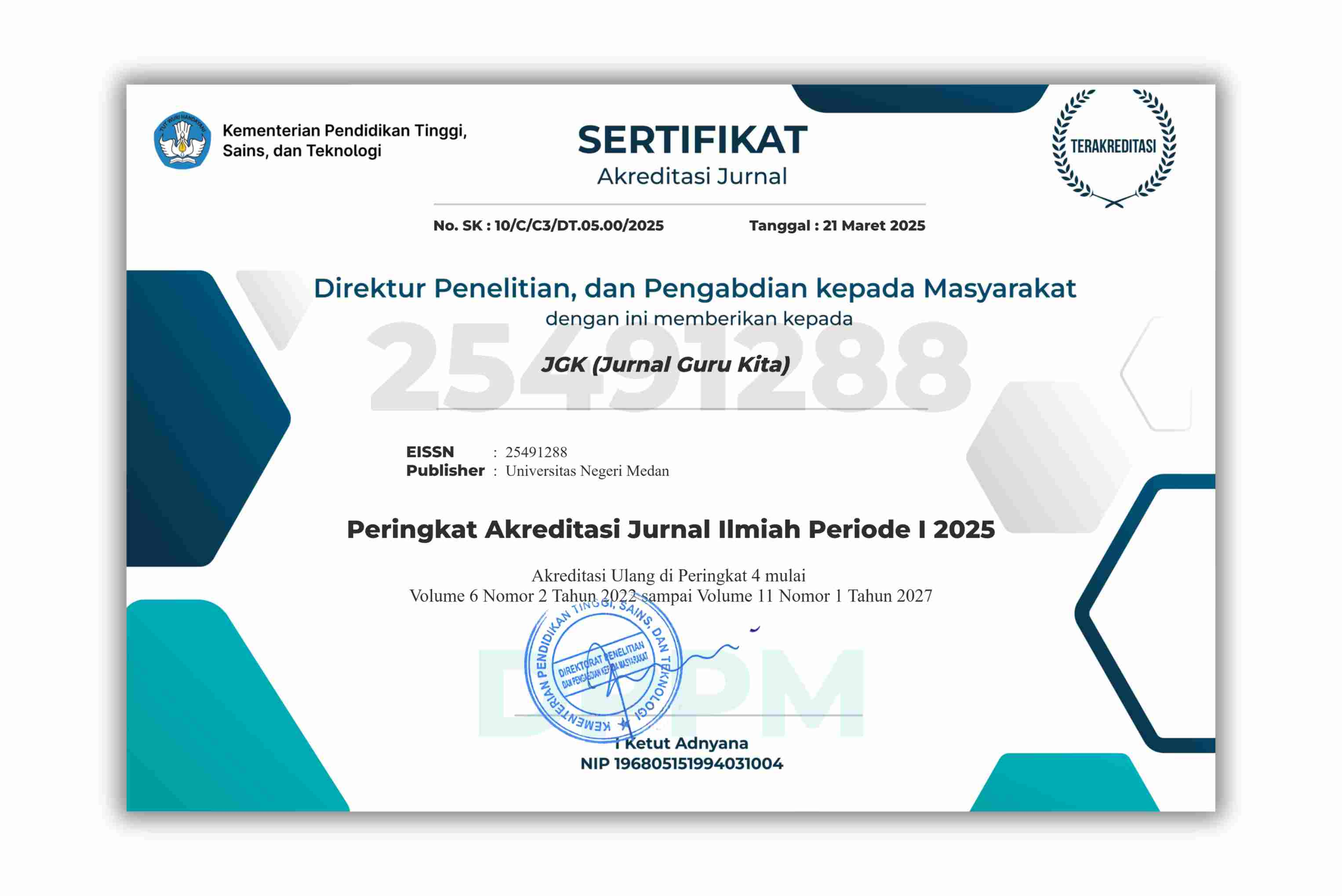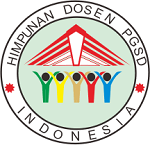Implementasi Model Pembelajaran Picture And Picture dibantu Media Articulate Storyline untuk Meningkatkan Minat dan Prestasi Belajar Siswa
DOI:
https://doi.org/10.24114/jgk.v9i4.65443Keywords:
Articulate Storyline, Picture And Picture, Prestasi Belajar, Minat BelajarAbstract
Tujuan dari penelitian ini adalah untuk meningkatkan minat belajar dan prestasi belajar siswa kelas V SDN 2 Dawuhan Kulon pada mata pelajaran IPAS melalui penerapan model Picture and Picture berbantu media Articulate Storyline. Penelitian menggunakan metode Penelitian Tindakan Kelas (PTK) yang dilaksanakan dalam dua siklus. Teknik pengumpulan data menggunakan observasi, angket, tes evaluasi, dan dokumentasi. Hasil penelitian menunjukkan peningkatan prestasi belajar siswa dari nilai rata-rata 64,81 pada siklus I menjadi 75 pada siklus II, dan persentase ketuntasan belajar meningkat dari 43,75% menjadi 81,25%. Selain itu, minat belajar siswa juga meningkat dari 52,23% menjadi 76%. Penerapan model Picture and Picture berbantu Articulate Storyline terbukti efektif menciptakan pembelajaran yang interaktif dan menyenangkan sehingga mampu meningkatkan kualitas belajar siswa.References
Abdillah, L. A., Fauziah, A., Napitupulu, D. S., Sulistiyo, H., Sakti, B. P., Nisa’Khusnia, A., Noveni, N. A., Chamidah, D., Puri, V. G. S., & Salman, I. (2021). Penelitian tindakan kelas: Teori dan penerapannya. Penerbit Adab.
Ahmed, B., Yaru, H., Rafiq, M., & Im, C. (2024). Escaping the Boredom Trap: Enhancing Usability With 3D Games in Monotonous Subjects. IEEE Access, 12, 180361–180384. https://doi.org/10.1109/ACCESS.2024.3434673
Aivelo, T., & Uitto, A. (2021). Factors explaining students’ attitudes towards learning genetics and belief in genetic determinism. International Journal of Science Education, 43(9), 1408–1425. https://doi.org/10.1080/09500693.2021.1917789
Almulla, M. A., & Al-Rahmi, W. M. (2023). Integrated Social Cognitive Theory with Learning Input Factors: The Effects of Problem-Solving Skills and Critical Thinking Skills on Learning Performance Sustainability. Sustainability, 15(5), 3978. https://doi.org/10.3390/su15053978
Ananda, R., Hadiyanto, H., Erita, Y., & Karneli, Y. (2023). Development of Android-Based Interactive Media Articulate Storyline 3 in the Merdeka Curriculum. Jurnal Penelitian Pendidikan IPA, 9(9), 6819–6827. https://doi.org/10.29303/jppipa.v9i9.5393
Arum Nissa, A. D., Toyib, M., Sutarni, S., Akip, E., Kadir, S., Ahmad, & Solikin, A. (2021). Development of Learning Media Using Android-Based Articulate Storyline Software for Teaching Algebra in Junior High School. Journal of Physics: Conference Series, 1720(1), 012011. https://doi.org/10.1088/1742-6596/1720/1/012011
Ayu Agustin, A., Farida Nugrahani, & Benedictus Sudiyana. (2024). Picture and Picture Learning Model with Picture Card Media on Grade IV Students’ Interest and Poetry Writing Skills. Jurnal Elementaria Edukasia, 7(4), 3197–3208. https://doi.org/10.31949/jee.v7i4.11028
Darmayanti, N. W. S., Selamet, K., Sanjayanti, N. P. A. H., Qondias, D., Wijaya, I. K. W. B., Witraguna, K. Y., Jaya, I. K. M. A., & Persi, N. N. (2024). Penelitian Tindakan Kelas (PTK): Panduan dan Implementasinya bagi Guru dan Mahasiswa. Nilacakra.
Daryanes, F., Darmadi, D., Fikri, K., Sayuti, I., Rusandi, M. A., & Situmorang, D. D. B. (2023). The development of articulate storyline interactive learning media based on case methods to train student’s problem-solving ability. Heliyon, 9(4).
Feng, Z., & Xiao, H. (2024). The impact of students’ lack of learning motivation and teachers’ teaching methods on innovation resistance in the context of big data. Learning and Motivation, 87, 102020. https://doi.org/10.1016/j.lmot.2024.102020
Fenti Farleni, Dewi Nancy Shabatini, Encep Syarifudin, & Cucu Atikah. (2024). Education Policies for Enhancing Professional Competence in Elementary School Teachers. Journal of Education Research and Evaluation, 8(1), 58–66. https://doi.org/10.23887/jere.v8i1.68733
Garzón, A., Kapelan, Z., Langeveld, J., & Taormina, R. (2022). Machine Learning‐Based Surrogate Modeling for Urban Water Networks: Review and Future Research Directions. Water Resources Research, 58(5). https://doi.org/10.1029/2021WR031808
Gore, J. M., Miller, A., Fray, L., Harris, J., & Prieto, E. (2021). Improving student achievement through professional development: Results from a randomised controlled trial of Quality Teaching Rounds. Teaching and Teacher Education, 101, 103297. https://doi.org/10.1016/j.tate.2021.103297
Hongsuchon, T., Emary, I. M. M. El, Hariguna, T., & Qhal, E. M. A. (2022). Assessing the Impact of Online-Learning Effectiveness and Benefits in Knowledge Management, the Antecedent of Online-Learning Strategies and Motivations: An Empirical Study. Sustainability, 14(5), 2570. https://doi.org/10.3390/su14052570
Idris, M., Pramono, S. E., & Yulianto, A. (2025). The Influence of using articulate storyline media on learning interest and results. Inovasi Kurikulum, 22(1), 235–248. https://doi.org/10.17509/jik.v22i1.75994
Karakoç, B., Eryılmaz, K., Turan Özpolat, E., & Yıldırım, İ. (2022). The Effect of Game-Based Learning on Student Achievement: A Meta-Analysis Study. Technology, Knowledge and Learning, 27(1), 207–222. https://doi.org/10.1007/s10758-020-09471-5
Kim, J., Lee, H., & Cho, Y. H. (2022). Learning design to support student-AI collaboration: perspectives of leading teachers for AI in education. Education and Information Technologies, 27(5), 6069–6104. https://doi.org/10.1007/s10639-021-10831-6
Lee, C.-W., & Hung, H.-H. (2024). The Impact of Education on Consumers’ Eco-Friendly Shopping Habits towards Sustainable Purchases: Evidence from Indonesia and Taiwan. Sustainability, 16(20), 8832. https://doi.org/10.3390/su16208832
Lo, K. W. K., Ngai, G., Chan, S. C. F., & Kwan, K. (2022). How students’ motivation and learning experience affect their service-learning outcomes: A structural equation modeling analysis. Frontiers in Psychology, 13, 825902. https://doi.org/10.3389/fpsyg.2022.825902
Majid, A. F., & Sekar Purbarini Kawuryana. (2024). Articulate Storyline 3 Interactive Media to Increase Learning Interest and Activeness of Fifth Grade Elementary School Students. Jurnal Ilmiah Sekolah Dasar, 7(4), 740–751. https://doi.org/10.23887/jisd.v7i4.61517
McChesney, K., & Aldridge, J. M. (2021). What gets in the way? A new conceptual model for the trajectory from teacher professional development to impact. Professional Development in Education, 47(5), 834–852. https://doi.org/10.1080/19415257.2019.1667412
Misnaiyah, & Mauliza, M. (2025). Increasing Students’ Interest in Learning Fiqh Subjects through the Picture and Picture Learning Model at MIN 14 Pidie Jaya. Journal of Indonesian Primary School, 2(1), 181–191. https://doi.org/10.62945/jips.v2i1.430
Nisma Iriani, S. E., Dewi, G. A. K. R. S., Sudjud, S., Talli, A. S. D., MM, S. E., Surianti, S. P., Adm, M., Setyowati, R. D. N., Lisarani, V., & MM, A. M. T. (2022). Metodologi penelitian. Rizmedia Pustaka Indonesia.
Pandiangan, A. P. B. (2020). Penelitian Tindakan Kelas (Sebagai Upaya Peningkatan Kualitas Pembelajaran, Profesionalisme Guru Dan Kompetensi Belajar Siswa). Deepublish.
Payadnya, I. P. A. A., Hermawan, I. M. S., Wedasuwari, I. A. M., & Jayantika, I. G. A. N. T. (2022). Panduan Lengkap Penelitian Tindakan Kelas (PTK). Deepublish.
Peng, X., Sun, X., & He, Z. (2022). Influence Mechanism of Teacher Support and Parent Support on the Academic Achievement of Secondary Vocational Students. Frontiers in Psychology, 13. https://doi.org/10.3389/fpsyg.2022.863740
Pohan, S. A., & Murti, R. C. (2022). Analysis of Factors Affecting Student Interest in Studying in a Pandemic Period in Basic Social Sciences Elementary School Concepts. AL-ISHLAH: Jurnal Pendidikan, 14(4), 4807–4814. https://doi.org/10.35445/alishlah.v14i4.2247
Pratiwi, K. I. A., Margunayasa, I. G., & Trisna, G. A. P. S. (2023). Project-Based Learning Interactive Multimedia with Orientation of Environmental Problems Assisted by Articulate Storyline 3 for Grade V Elementary Schools. Journal of Education Technology, 7(2), 332–342. https://doi.org/10.23887/jet.v7i2.59615
Ramadhani, I. A., & Asrul, A. (2024). Development of Interactive Learning Media Based on Articulate Storyline to Improve Student’ Science Literacy. Lectura : Jurnal Pendidikan, 15(2), 533–545. https://doi.org/10.31849/lectura.v15i2.20974
Saadatul Ummah, F., Suwantoro, Ahmad Safi’ie Hadi, Fatma, & Syaifudin Noer. (2024). The Role of Religious Research in Shaping an Outstanding Generation of Islamic Education at Universitas Negeri Surabaya. Progresiva : Jurnal Pemikiran Dan Pendidikan Islam, 13(03), 423–440. https://doi.org/10.22219/progresiva.v13i03.37276
Sekarsari, E. P., & Rusnilawati, R. (2023). The Effect of Team Games Tournament Model-Assisted Articulate Storyline Media on Improving Outcomes and Interest in Learning Javanese Script Material in Elementary School. Mimbar Sekolah Dasar, 10(1), 281–296. https://doi.org/10.53400/mimbar-sd.v10i1.55262
Sumaryanti, S., & Purwanto, N. A. (2023). Achieving the Quality of Education through the Application of Eight National Education Standards using School-Based Management. AL-ISHLAH: Jurnal Pendidikan, 15(1), 135–146. https://doi.org/10.35445/alishlah.v15i1.1652
Tanjung, D. S., Mahulae, S., & Tumanggor, A. F. M. (2022). Pengaruh Penggunaan Model Pembelajaran Picture And Picture Berbantuan Media Audio Visual Terhadap Hasil Belajar Siswa. JURNAL MUTIARA PENDIDIKAN INDONESIA, 7(2), 144–154. https://doi.org/10.51544/mutiarapendidik.v7i2.3393
Tong, D. H., Uyen, B. P., & Ngan, L. K. (2022). The effectiveness of blended learning on students’ academic achievement, self-study skills and learning attitudes: A quasi-experiment study in teaching the conventions for coordinates in the plane. Heliyon, 8(12), e12657. https://doi.org/10.1016/j.heliyon.2022.e12657
Wang, C., Zhao, Z., Zhou, M., Sigmund, O., & Zhang, X. S. (2021). A comprehensive review of educational articles on structural and multidisciplinary optimization. Structural and Multidisciplinary Optimization, 64(5), 2827–2880. https://doi.org/10.1007/s00158-021-03050-7
Warso, A. W. D. D. (2021). Mengenal penelitian tindakan kelas dan dilengkapi contohnya. Deepublish.
Wilyanti, V., Yulya, T., Febriyani, T., & Rahmadani, S. (2023). Development of Articulate Storyline 3 Learning Media Based on Local Wisdom in Traditional Lampung GamesIn Improving Science Skills (pp. 756–766). https://doi.org/10.2991/978-2-38476-060-2_68
Wolters, C. A., & Brady, A. C. (2021). College Students’ Time Management: a Self-Regulated Learning Perspective. Educational Psychology Review, 33(4), 1319–1351. https://doi.org/10.1007/s10648-020-09519-z
Wolters, C. A., Brady, A. C., & Lee, H. J. (2025). Time Management and Achievement Motivation: A Review of What We Know and Directions for Where to Go. Educational Psychology Review, 37(2), 58. https://doi.org/10.1007/s10648-025-10032-4
Wu, R., & Yu, Z. (2024). Do AI chatbots improve students learning outcomes? Evidence from a meta‐analysis. British Journal of Educational Technology, 55(1), 10–33. https://doi.org/10.1111/bjet.13334
Zhu, Y., & Kaiser, G. (2022). Impacts of classroom teaching practices on students’ mathematics learning interest, mathematics self-efficacy and mathematics test achievements: a secondary analysis of Shanghai data from the international video study Global Teaching InSights. ZDM – Mathematics Education, 54(3), 581–593. https://doi.org/10.1007/s11858-022-01343-9
Zsóka, Á., & Ásványi, K. (2023). Transforming students’ behaviour preferences: achievable changes by a sustainability course. International Journal of Sustainability in Higher Education, 24(1), 141–159. https://doi.org/10.1108/IJSHE-01-2022-0018
Downloads
Published
How to Cite
Issue
Section
License
Copyright (c) 2025 Arma Atus Solikhah, Agung Nugroho

This work is licensed under a Creative Commons Attribution-ShareAlike 4.0 International License.
Authors published with the JGK (Jurnal Guru Kita) agree to the following terms:
- Authors retain copyright and grant the journal the right of first publication with the work simultaneously licensed under a Creative Commons Attribution License (CC BY-SA 4.0) that allows others to share the work with an acknowledgment of the work's authorship and initial publication in this journal.
- Authors are able to enter into separate, additional contractual arrangements for the non-exclusive distribution of the journal's published version of the work (e.g., post it to an institutional repository or publish it in a book), with an acknowledgment of its initial publication in this journal.
- Authors are permitted and encouraged to post their work online (e.g., in institutional repositories or on their website) prior to and during the submission process, as it can lead to productive exchanges, as well as earlier and greater citation of published work. (See The Effect of Open Access)

























